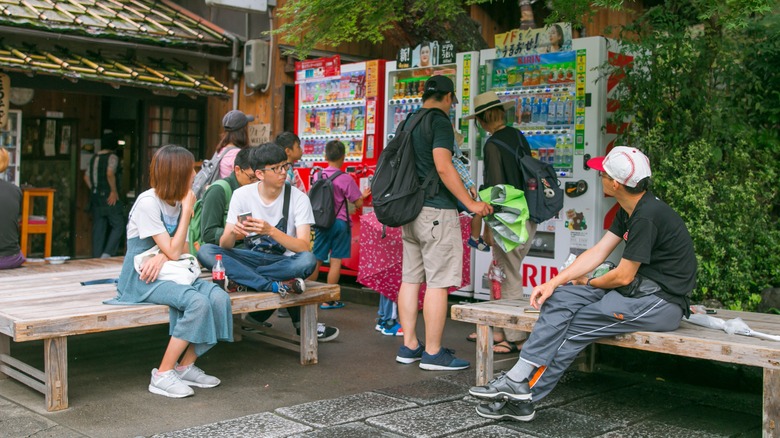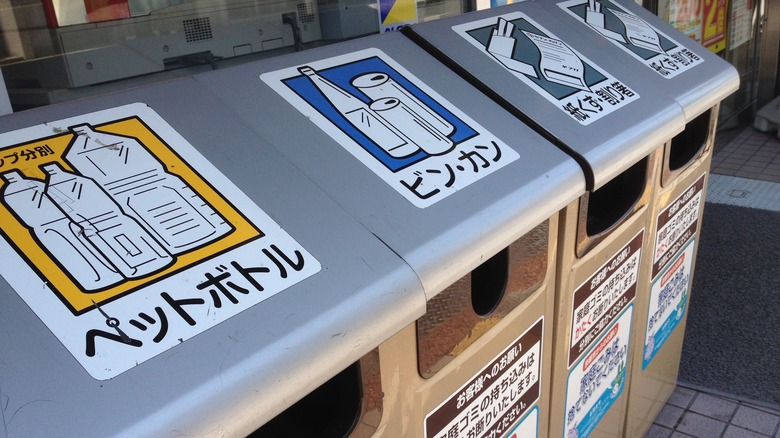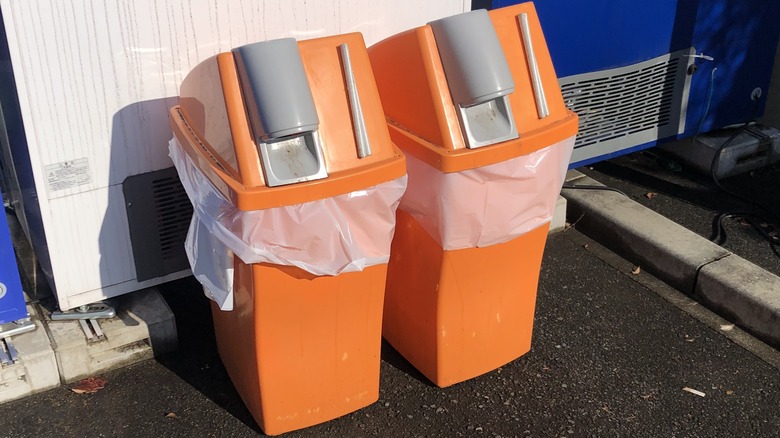The Common Object Tourists Visiting Japan Might Have Trouble Finding
Don't be surprised if you can't find a public trash can when you come to Japan. It's something tourists might take for granted, especially if you're used to visiting cities like New York. The Big Apple has over 22,000 trash cans, and in 2023, it even appointed a rat czar and unveiled a newly designed "litter basket of the future," as the city's sanitation commissioner called it (via The New York Times). Japanese cities, however, have a different approach to keeping their streets clean, and it relies more on community effort.
Even in Tokyo, where it feels like there's a vending machine on every street corner, public trash cans are in short supply. High-traffic tourist spots like Omotesando or the former capital, Kyoto, have lately been testing out solar-powered "smart" bins, but the doomsday cult Aum's 1995 sarin attack on Tokyo's subway system led to the widespread removal of trash cans from Japanese cities. Other global cities, like Paris, London, and New York, have adopted similar temporary measures following terrorist attacks. The difference with Japan is that the change was largely permanent.
Cities here remain remarkably well-adapted to the scarcity of public trash cans, a fact that might seem at odds with their relative cleanliness. While not the biggest culture shock you could have while traveling abroad, it might leave some first-time visitors searching high and low for a place to throw their garbage while at the same time wondering how there's not more litter on the street in Japan.
Public trash cans in convenience stores and train stations
Let's say you're on the go in Tokyo and decide to do an Anthony Bourdain, buying an egg salad sandwich from the convenience store Lawson. This immediately presents the dilemma of what to do with the wrapper after you scarf down your sandwich. If you're using train lines operated by JR (Japan Railways) to get around town, their stations can sometimes be a lifesaver for getting rid of trash while on the move. Keep your eyes peeled, and you might find a row of see-through garbage and recycle bins in the station or on the train platform. Yet this doesn't apply everywhere, and in recent years, major subway operators like Tokyo Metro have gone in the opposite direction and removed even more of the city's few remaining public trash cans.
Lawson, Family Mart, and the ubiquitous 7-Eleven, which boasts over 21,000 locations in Japan, usually have trash cans near the door. Since eating while walking goes against custom in Japan, you may want to avail yourself of the trash can before you leave. Or you can pay 3 or 5 yen for a plastic shopping bag (they're not freely given) and use that to tote your trash. If you go with the former option, you'll often find a row of receptacles with explanatory pictures. There should be one for plastic bottles (marked "PET"), one for glass bottles and cans, and one for "combustibles," which covers most other garbage considered burnable trash.
Recycle bins and carrying your trash
On the street in Japan, when you buy a drink (or ramen noodles) from a vending machine, it can be hit-or-miss whether or not there's a recycle bin available. You may encounter some machines where there's a built-in bin, no bin at all, or one that's already overflowing. Sometimes, the bins are hidden behind machines to prevent passersby from casually disposing of outside plastic bottles. In the 2020s, new orange recycle bins with round, bottle-shaped openings pointed downward have also begun popping up, their design meant to further discourage people from tossing in non-recyclable refuse.
This is when it helps to have a bag, backpack, or purse where you can stow your loose trash until you return to your hotel. While it may be inconvenient to carry your garbage around, think of it as part of the travel experience, broadening your horizons culturally. The daily ritual of students playing janitor and cleaning their own schools in Japan helps instill a sense of personal responsibility in people with things like litter.
Even in the aftermath of huge holiday street parties (think Times Square on New Year's Eve), volunteers have been known to step in the next morning to aid clean-up in Shibuya. Those rare bins you see in train stations are also a microcosm for Japan's trash sorting system at home, which involves an elaborate array of color-coded bags for sifting garbage. When in Rome, do as the trash experts do (and don't litter).


